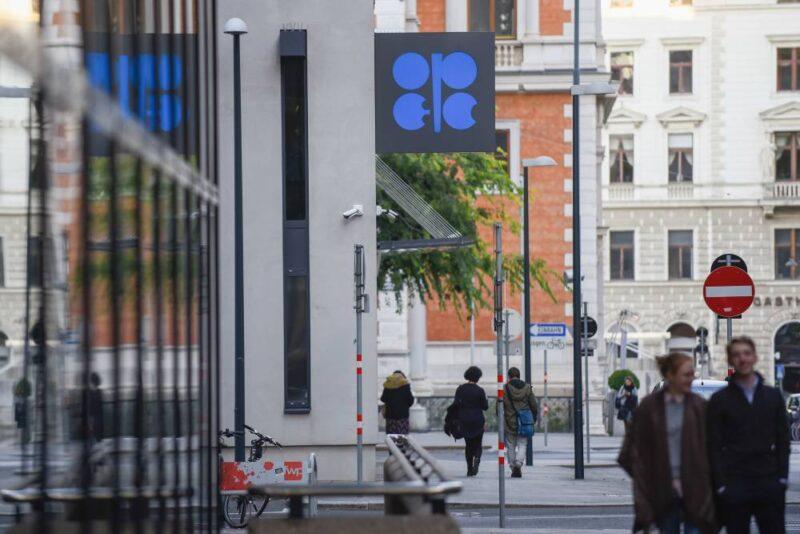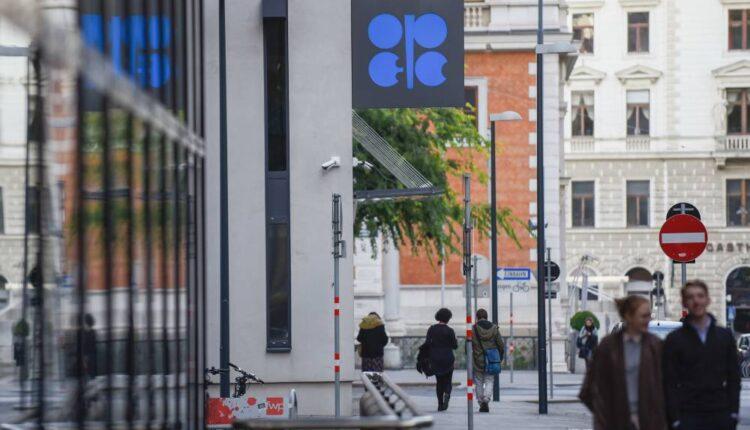
- The deal was agreed on by all OPEC and non-OPEC producers participating in the conference, with the exception of Mexico.
- It means the cuts, which amount to roughly 10% of global supply, will not take place unless the broader alliance also receives their consent.
- Energy ministers from the Group of 20 major economies will convene for their own extraordinary video meeting on Friday.
The logo of the Organization of the Petroleum Exporting Countries (OPEC) at the headquarters.Omar Marques | LightRocket | Getty Images
Oil producer group OPEC and its allies failed to comprehensively secure a deal to take a historic amount of crude off the market on Thursday, after Mexico balked at the suggested production cuts.
An energy alliance of some of the world's most powerful oil producers, sometimes referred to as OPEC+, proposed a deal to cut 10 million barrels per day following a marathon video meeting that stretched deep into the evening.
The deal was agreed on by all OPEC and non-OPEC producers participating in the conference, with the exception of Mexico. It means the cuts, which amount to roughly 10% of global supply, will not take place unless the broader alliance also receives their consent.
U.S. West Texas Intermediate fell 9.29%, or $2.33, to settle at $22.76 per barrel on Thursday evening. Earlier in the session, the contract had been up more than 12% trade at a session high of $28.36. International benchmark Brent crude slipped 4.14% to settle at $31.48, after earlier hitting a high of $36.40.
Both Brent and WTI futures are in bear market territory, down 53% and 63% respectively since climbing to a January peak.
To be sure, the suggested cuts are far larger than any deal OPEC+ has ever agreed on before, but many are concerned it won't be enough to prop up prices with the market already awash with crude as the coronavirus crisis ravages global demand.
Energy ministers from the Group of 20 major economies will convene for their own extraordinary video meeting on Friday. Mexico, the outlier to the record production cuts suggested by OPEC+ on Thursday, will be present at the meeting.
What has been proposed?
Led by OPEC kingpin Saudi Arabia and non-OPEC leader Russia, the group outlined a cut of 10 million barrels per day from May 1 for an initial period of two months through to June 30.
For the subsequent six months, OPEC+ said in a statement that from July 1 through to December 2020, the total adjustment agreed would amount to a cut of 8 million barrels per day.
Thereafter, for a period of 16 months through to April 30, 2022, the cuts would amount to 6 million barrels per day.
Following Thursday's emergency meeting, Mexico's Secretary of Energy Rocio Nahle said in a tweet that the country would be willing to cut production by 100,000 barrels per day for the next two months. OPEC+ had reportedly asked for a cut of 400,000 barrels per day, according to Reuters.
Crucially, the record size of the potential cut was not contingent on nations outside of OPEC+ curbing production, which some had suggested might be a stipulation for Saudi Arabia and Russia to scale back production.
OPEC+ has urged major producers, including the U.S., to sign up to further production cuts in an effort to help the industry cope with the coronavirus pandemic.
"Covid-19 is an unseen beast that seems to be impacting everything in its path," OPEC Secretary General Mohammad Barkindo said at the meeting. "For the oil market, it has completely up-ended market supply and demand fundamentals since we last met on 6 March," he added.
'Too little, too late'
Earlier this week, the G-20 presidency said in a statement that Friday's meeting would be held "to foster global dialogue and cooperation to ensure stable energy markets and enable a stronger global economy."
Saudi Arabia, OPEC's de-facto leader, holds the rotating G-20 presidency this year.
"At the current rate of stock build, storage will be full at some point in May and crude production will need to be curtailed by 15-20 million barrels per day," Chris Midgley, global head of analytics at S&P Global Platts, told CNBC via email.
"The current proposed 10 million barrels per day may be too little too late as it will have limited impact on April production and only if sustained from May for the balance of the year might we avoid hitting tank tops," he added.
— CNBC's Pippa Stevens contributed to this report.
Source: cnbc.com

